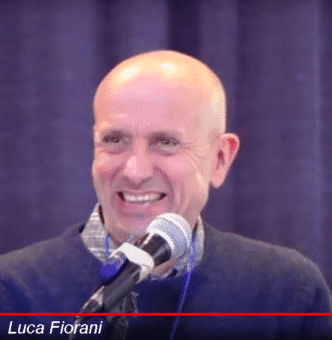
Jul 14, 2020 | Non categorizzato
Five years have passed since the publication of Laudato Si’, Pope Francis’ encyclical on the care of the planet.  Here we discuss it with Luca Fiorani, professor at the universities of Lumsa, Marconi and Sophia; ENEA researcher; and head of EcoOne, the Focolare Movement’s ecological network. In these times of pandemic, what lessons can come from Laudato Si’ and its paradigm of integral ecology? I am thinking of how “everything is connected”. The pope, before the pandemic, made us savour its positive side, the wonderful relationship that exists between elements of nature, including people. The pandemic, on the other hand, has brought out the dark side of “everything is connected”, because human activity, which led to the destruction of natural habitats, and the virus’s leap of species from animal to man are linked. What is the evangelical foundation of being committed to care for creation? It is “Love thy neighbour as thyself.” One of the key concepts of Laudate is, “Listen to both the cry of the earth and the cry of the poor”. It is true that for the Gospel, nature has value in itself, but it is also true that caring for nature means ensuring a healthy planet for the most disadvantaged and for our children. It means reminding us of the “lower billion” – those billion people who are victims of a “chronic pandemic” due to 17 neglected tropical diseases. Can the concept of integral ecology guide the future? This is the fundamental concept of all Pope Francis’ teaching, which invites us to overcome the current socioeconomic system. Today we still live with the paradigm of the industrial revolution, which considers natural resources unlimited. Yet resources are indeed limited, and therefore we need to find a different model of development that also takes into account the needs of peoples forgotten by so-called “evolved” societies. Laudate calls for a change of attitude. What does it mean to live the principles of integral ecology? Integral ecology concerns not only the environment but all aspects of human life: society, economy and politics. Therefore each of us must try to change our lives, starting, for example, with consumer choices. Then we can choose leaders who are sensitive to caring for nature and campaign to apply pressure to disinvest from fossil fuels in favour of renewable energy. In this special year of Laudato Si’ celebrations, how will the Focolare Movement participate? The movement participates in initiatives of the Catholic Church and in events promoted by the Global Catholic Climate Movement, to which it adheres. In addition, it is organising a “New ways towards integral ecology” conference, to be held at Castel Gandolfo (RM) from 23–25 October, details of which are available at ecoone.org. Your latest book is entitled Francesco’s crazy dream: a small (scientific) manual of integral ecology. Why do you speak of a crazy dream? Because it truly seems impossible to change the course of this planet towards a world where we all feel like brothers and sisters, and build more bridges than walls. But as Focolare’s founder Chiara Lubich said, “Only those who have great ideals make history!”
Here we discuss it with Luca Fiorani, professor at the universities of Lumsa, Marconi and Sophia; ENEA researcher; and head of EcoOne, the Focolare Movement’s ecological network. In these times of pandemic, what lessons can come from Laudato Si’ and its paradigm of integral ecology? I am thinking of how “everything is connected”. The pope, before the pandemic, made us savour its positive side, the wonderful relationship that exists between elements of nature, including people. The pandemic, on the other hand, has brought out the dark side of “everything is connected”, because human activity, which led to the destruction of natural habitats, and the virus’s leap of species from animal to man are linked. What is the evangelical foundation of being committed to care for creation? It is “Love thy neighbour as thyself.” One of the key concepts of Laudate is, “Listen to both the cry of the earth and the cry of the poor”. It is true that for the Gospel, nature has value in itself, but it is also true that caring for nature means ensuring a healthy planet for the most disadvantaged and for our children. It means reminding us of the “lower billion” – those billion people who are victims of a “chronic pandemic” due to 17 neglected tropical diseases. Can the concept of integral ecology guide the future? This is the fundamental concept of all Pope Francis’ teaching, which invites us to overcome the current socioeconomic system. Today we still live with the paradigm of the industrial revolution, which considers natural resources unlimited. Yet resources are indeed limited, and therefore we need to find a different model of development that also takes into account the needs of peoples forgotten by so-called “evolved” societies. Laudate calls for a change of attitude. What does it mean to live the principles of integral ecology? Integral ecology concerns not only the environment but all aspects of human life: society, economy and politics. Therefore each of us must try to change our lives, starting, for example, with consumer choices. Then we can choose leaders who are sensitive to caring for nature and campaign to apply pressure to disinvest from fossil fuels in favour of renewable energy. In this special year of Laudato Si’ celebrations, how will the Focolare Movement participate? The movement participates in initiatives of the Catholic Church and in events promoted by the Global Catholic Climate Movement, to which it adheres. In addition, it is organising a “New ways towards integral ecology” conference, to be held at Castel Gandolfo (RM) from 23–25 October, details of which are available at ecoone.org. Your latest book is entitled Francesco’s crazy dream: a small (scientific) manual of integral ecology. Why do you speak of a crazy dream? Because it truly seems impossible to change the course of this planet towards a world where we all feel like brothers and sisters, and build more bridges than walls. But as Focolare’s founder Chiara Lubich said, “Only those who have great ideals make history!”
Claudia Di Lorenzi
Jul 13, 2020 | Non categorizzato
Being in lockdown has often tested our love of neighbour. In fact, it is not easy to live shut up in a house and find ourselves always so close to one another. When this happens we push against each other’s limits and this calls for a “supplement of love” called “bearing with”. It is consoling to know that Chiara Lubich also encountered this type of difficulty in her community life. Some days ago I started reading a book called The Secret of Mother Teresa; Teresa of Calcutta of course. I opened it at the chapter that speaks of the “mystic of charity”. I read that chapter and others, immersing myself in those pages with great interest: everything to do with this future saint is of personal interest to me since, for years, she was a very dear friend of mine. I was suddenly struck by the extreme radicalness of her life, by her totally committed vocation, which was awesome, almost frightening. Above all, however, it urged me to imitate her in the particular, radical and total commitment that God asks of me. … Prompted by this conviction, I began to read our Statutes, sure that I would find there the measure and type of radicalness that the Lord is asking of me. I opened it and immediately, on the very first page, I received a small spiritual shock, like when you discover something in that very moment (although I have known it for almost sixty years!). It was the “norm of norms, the premise to every other rule” of my life, of our life: to generate – as Pope Paul VI put it – and maintain first and foremost … Jesus among us through mutual love. … I decided to live this norm first of all in my focolare and with those around me. We know that Jesus said: “Let anyone among you who is without sin be the first to throw a stone at her” (Jn 8:7). Not everything is perfect in our focolare either. There might be an unnecessary word said by me or by others; too long a silence, a rash judgement, a small attachment, a suffering not borne patiently, which undoubtedly makes Jesus among us feel uncomfortable, even if it doesn’t prevent his presence altogether. I understood that I had to be the first to make room for Him, to pave the way, smoothing things over, seasoning everything with the greatest charity, bearing with everything, both in the others and in myself. “Bearing with” is not a term we generally use, but the Apostle Paul advises us to do it (see 1 Cor 13:7). Certainly, to bear with everything requires not just an ordinary kind of love. It is a special love, the essence of love. I began doing this. And there were positive results! Other times, I would have immediately invited my companions to do the same, but not this time. I felt I had to be the first to do all my part, and it worked. Besides, it filled my heart with happiness maybe because, in this way, He came back into our midst and remained. Later on I will tell them, but I still felt the duty to carry on doing this as if I were alone. And my joy was immense when I thought of Jesus’ words: “I desire mercy, not sacrifice” (Mt 9:13). Mercy! This is the super-refined love that is asked of us and that is worth more than sacrifice, because the most beautiful sacrifice is this love that can bear with everything, that can forgive and forget when necessary. This is the radicalness and total commitment we are asked to live.
Chiara Lubich
(From a telephone conference call, Rocca di Papa, 20th February 2003)
Jul 11, 2020 | Non categorizzato
Maria Voce, President of the Focolare Movement, says Chiara Lubich’s interreligious dialogue, “was a true prophecy that is now being fulfilled as a concrete response to the needs of humanity”. Co-President Jesús Morán explains how the ethics of care is at the basis of the new Pathway that will be launched on June 20, 2020 by the young people of the Focolare Movement. https://vimeo.com/429994085
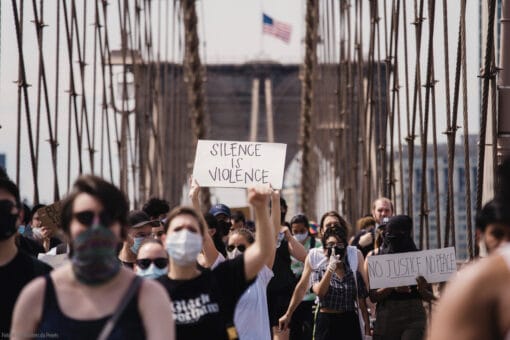
Jul 10, 2020 | Non categorizzato
Can the two major crises currently rocking the United States – the pandemic and racism –lead to a better future? Susanne Janssen, editor of Living City Magazine, reflects.  Racism is a virus that has never been eradicated in the United States. After the Civil War (1861-1865), slavery was legally abolished, but still today people of color and white people are not treated in the same way. The death of George Floyd has shone a light on this problem. The fact that those 8 atrocious minutes of George Floyd pleading for his life were captured on video means it could no longer be blamed on the victim. This video, together with the large number of people (not only Afro-Americans) who united to protest against racism, are a sign that this time something is different. Our hope is all that has happened will not end with a wave of protests but will lead to real change. The role of the Catholic Church After a few days’ silence, the Catholic Church positioned itself alongside the anti-racism protestors. The Cardinal of Boston, Seán O’Malley wrote that the killing of George Floyd “is painful evidence of what is and has been at stake for African Americans – the failure of society in too many ways to protect their lives and the lives of their children. The demonstrations and protests of these days have been calls for justice and heart wrenching expressions of deep emotional pain from which we cannot turn away”. The United States Conference of Catholic Bishops has described racism as the “original sin” of their country, persisting through the nation’s history, festering to this day. Reflection on the issue is now gaining ground in the Church and society. The first steps The slogan “defund the police” calls for something more than a simple restructuring of police departments. It demands a completely new start, to create a police force which is more accountable to its citizens. In recent years much has been said about the increasing militarization of the police; but to tell the truth, much of what they do, should actually be the role of social workers. What differentiates today from the violence suffered by Afro-Americans in the past, is the way many people are striving to learn from, listen and face up to the past, focusing on those structural issues which have lingered since the time of the abolition of slavery and segregation, such as the so-called “Jim Crow laws” and the 1964 Civil Rights Act. Yes, because the first step has to be facing up to those prejudices within everyone, and the social privileges generally afforded to white people. Authors Ibram X. Kendi and Robin DiAngelo declare that “being a good person” is not enough in this regard. The step required is to oppose the very structures of oppression, as even now, in a routine police check, the color of your skin can make the difference between life and death. The contribution of the Focolare Movement Firstly, Focolare communities are looking hard at themselves for traces of discrimination and racism. The Focolare’s thinking on racial justice is an essential starting point before entering in sincere dialogue with one another and with people around us. We create space to listen to the painful testimonies of racism endured, and also to the experience of those raised in predominantly white environments who are striving to engage in a process of recognizing their own limits. These are not easy conversations, but they are necessary in order to build relationships that are more real. “If we’re not careful, we risk reinforcing the principles of popular rhetoric on diversity which too often support the privileged and accentuate the differences,” affirms an academic of color. Another Focolare member now more than 80 years old, he too an academic, admits that throughout his life he has had to learn to become more open, particularly when one of his daughters married a Jamaican. “I was worried their children would suffer discrimination. But now I see they are a shining example for many”. The role of youth Young people are in the front line demanding a change of mentality. One young girl of mixed race said, “I want to help my brothers and sisters to be listened to more, otherwise I will regret it for the rest of my life…” The very “Black Lives Matter” slogan which united many people, drawing them out onto the streets in huge numbers, has itself been targeted to provoke polarization. It’s not rare to come across messages which strive to discredit those campaigning for more justice. However, there are also signs of a gradual change in public opinion. In fact, many have condemned President Donald Trump’s handling of the recent crises: the pandemic and structural racism. At time of writing, the Democratic Party candidate, Joe Biden, has a 13% lead in the polls, but it’s far too early to predict the situation come November when Americans go out to vote.
Racism is a virus that has never been eradicated in the United States. After the Civil War (1861-1865), slavery was legally abolished, but still today people of color and white people are not treated in the same way. The death of George Floyd has shone a light on this problem. The fact that those 8 atrocious minutes of George Floyd pleading for his life were captured on video means it could no longer be blamed on the victim. This video, together with the large number of people (not only Afro-Americans) who united to protest against racism, are a sign that this time something is different. Our hope is all that has happened will not end with a wave of protests but will lead to real change. The role of the Catholic Church After a few days’ silence, the Catholic Church positioned itself alongside the anti-racism protestors. The Cardinal of Boston, Seán O’Malley wrote that the killing of George Floyd “is painful evidence of what is and has been at stake for African Americans – the failure of society in too many ways to protect their lives and the lives of their children. The demonstrations and protests of these days have been calls for justice and heart wrenching expressions of deep emotional pain from which we cannot turn away”. The United States Conference of Catholic Bishops has described racism as the “original sin” of their country, persisting through the nation’s history, festering to this day. Reflection on the issue is now gaining ground in the Church and society. The first steps The slogan “defund the police” calls for something more than a simple restructuring of police departments. It demands a completely new start, to create a police force which is more accountable to its citizens. In recent years much has been said about the increasing militarization of the police; but to tell the truth, much of what they do, should actually be the role of social workers. What differentiates today from the violence suffered by Afro-Americans in the past, is the way many people are striving to learn from, listen and face up to the past, focusing on those structural issues which have lingered since the time of the abolition of slavery and segregation, such as the so-called “Jim Crow laws” and the 1964 Civil Rights Act. Yes, because the first step has to be facing up to those prejudices within everyone, and the social privileges generally afforded to white people. Authors Ibram X. Kendi and Robin DiAngelo declare that “being a good person” is not enough in this regard. The step required is to oppose the very structures of oppression, as even now, in a routine police check, the color of your skin can make the difference between life and death. The contribution of the Focolare Movement Firstly, Focolare communities are looking hard at themselves for traces of discrimination and racism. The Focolare’s thinking on racial justice is an essential starting point before entering in sincere dialogue with one another and with people around us. We create space to listen to the painful testimonies of racism endured, and also to the experience of those raised in predominantly white environments who are striving to engage in a process of recognizing their own limits. These are not easy conversations, but they are necessary in order to build relationships that are more real. “If we’re not careful, we risk reinforcing the principles of popular rhetoric on diversity which too often support the privileged and accentuate the differences,” affirms an academic of color. Another Focolare member now more than 80 years old, he too an academic, admits that throughout his life he has had to learn to become more open, particularly when one of his daughters married a Jamaican. “I was worried their children would suffer discrimination. But now I see they are a shining example for many”. The role of youth Young people are in the front line demanding a change of mentality. One young girl of mixed race said, “I want to help my brothers and sisters to be listened to more, otherwise I will regret it for the rest of my life…” The very “Black Lives Matter” slogan which united many people, drawing them out onto the streets in huge numbers, has itself been targeted to provoke polarization. It’s not rare to come across messages which strive to discredit those campaigning for more justice. However, there are also signs of a gradual change in public opinion. In fact, many have condemned President Donald Trump’s handling of the recent crises: the pandemic and structural racism. At time of writing, the Democratic Party candidate, Joe Biden, has a 13% lead in the polls, but it’s far too early to predict the situation come November when Americans go out to vote.
Susanne Janssen, Editor, Living City magazine
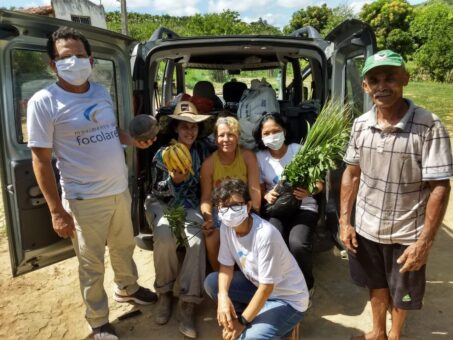
Jul 9, 2020 | Non categorizzato
The Focolare social organizations serve more than 3,500 families and create networks of solidarity during the pandemic. Distributed throughout the country, the twenty-one social organizations inspired by the charism of the Focolare Movement are giving an important witness of solidarity and fraternity during this pandemic.
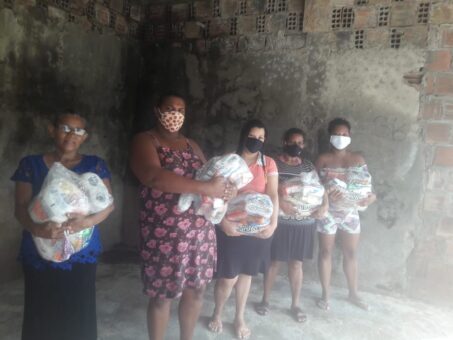
Foto: Obra Lumen

Foto: Instituto Mundo Unido
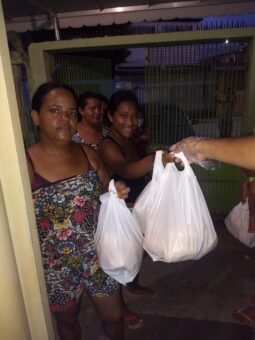
Jul 8, 2020 | Non categorizzato
If, on the one hand, the government shows its inability to lead Brazilians towards overcoming the crisis, on the other, an impressive humanitarian network is being woven. An in-depth study by the editor-in-chief of Cidade Nova. When I started writing this article from March, when the disease arrived in the country, more than 51,000 people had already died in Brazil, victims of Covid-19. In addition, it has been estimated that over 1 million people have already been infected. This is without considering the cases not officially reported. In cities where circulation has recently been allowed once more, the number of new cases has increased significantly. Apart from the good news that most of these people have survived this further spread of coronanvirus, the number of deaths is appalling. For specialists this disastrous situation can be explained by the position of the Federal Government in the fight against the disease and also the lack of awareness of many Brazilian citizens about the seriousness of Covid-19.
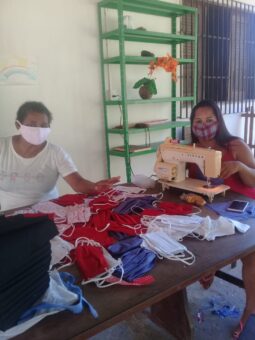
Foto: Magnificat
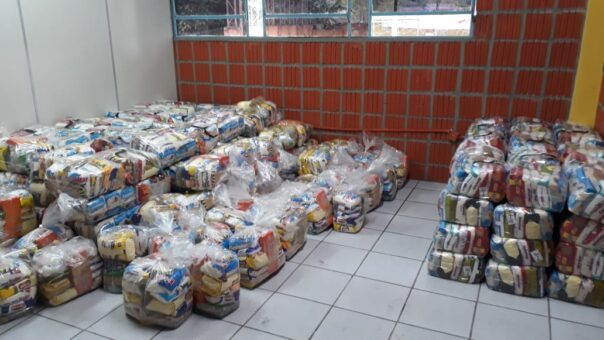
Foto: Centro Social Roger Cunha Rodrigues
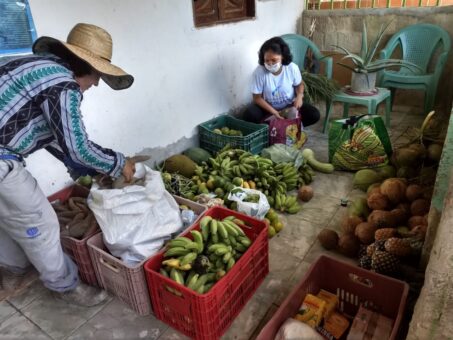
Foto: Instituto Mundo Unido

Foto: Associação de Atendimento a Criança e ao Adolescente
Luís Henrique Marques
Editor-in-chief of Cidade Nova magazine
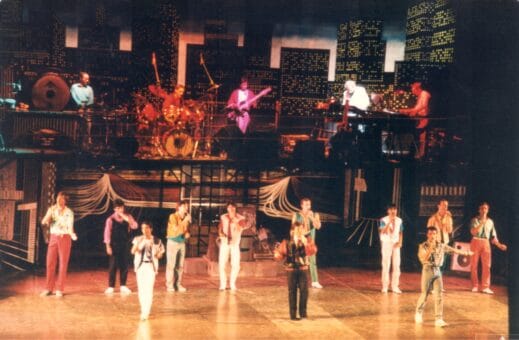
Jul 7, 2020 | Non categorizzato
Getting back to the historical roots of this international performing arts group The coronavirus and the ensuing lockdown upended everyone’s routines and schedules. Even the international performing arts group Gen Rosso had to reinvent its days after having to stay locked indoors.  “This lockdown has given each of us the chance to go even deeper into those messages that we have been singing for more than 50 years,” says production manager Massimiliano Zanoni. “We’re used to traveling the world, meeting people and bringing music to stages on five continents, but we found ourselves locked inside the four walls of our house. Instead of cities, seas and mountains, we now had a computer and few windows to look out of. And instead of the thousands of people we met on each tour, we now had three, four people living with us. All 25 of us could not work, create and play together as we had done for 53 years. And so, after a first series of live streams called “Gen Rosso a casa tua,” in which they joined people virtually in their home, they thought they would get back to their roots with some historical live shows. The “Discovering Gen Rosso” project started to bring people back into the band’s home.
“This lockdown has given each of us the chance to go even deeper into those messages that we have been singing for more than 50 years,” says production manager Massimiliano Zanoni. “We’re used to traveling the world, meeting people and bringing music to stages on five continents, but we found ourselves locked inside the four walls of our house. Instead of cities, seas and mountains, we now had a computer and few windows to look out of. And instead of the thousands of people we met on each tour, we now had three, four people living with us. All 25 of us could not work, create and play together as we had done for 53 years. And so, after a first series of live streams called “Gen Rosso a casa tua,” in which they joined people virtually in their home, they thought they would get back to their roots with some historical live shows. The “Discovering Gen Rosso” project started to bring people back into the band’s home.  “Many people don’t know that we don’t just do concerts,” Zanoni says, “but projects with schools too. There’s also the “Village,” which are weeks of living together with young artists to give them the experience of unity as they create artistically. “So just as when you invite someone to your house for the first time and, as a sign of welcome, show them around the house, Discovering Gen Rosso is a way to show some pages of our album of memories. This includes the musical Una Storia che Cambia or Streetlight, and helping them participate in our current projects, like the Village and Forti Senza Violenza, as well as revealing some small ideas for the future.” Discovering Gen Rosso is a new step towards that evolution that has allowed the international group to be builders of unity all over the world, over so many years of history. Here what’s next on the schedule, from the band’s YouTube page: On 16 July, there will be live streaming about the Village (artistic performance courses with Gen Rosso). On 28 July, they will launch their new single, “Shock of the World.” (It’s actually much more than a single, since there’s a whole new album in the pipeline that will be unveiled soon.) Finally, on 2 August the live stream series will conclude with their LIFE concert, the latest production by Gen Rosso, live from Loppiano in Italy.
“Many people don’t know that we don’t just do concerts,” Zanoni says, “but projects with schools too. There’s also the “Village,” which are weeks of living together with young artists to give them the experience of unity as they create artistically. “So just as when you invite someone to your house for the first time and, as a sign of welcome, show them around the house, Discovering Gen Rosso is a way to show some pages of our album of memories. This includes the musical Una Storia che Cambia or Streetlight, and helping them participate in our current projects, like the Village and Forti Senza Violenza, as well as revealing some small ideas for the future.” Discovering Gen Rosso is a new step towards that evolution that has allowed the international group to be builders of unity all over the world, over so many years of history. Here what’s next on the schedule, from the band’s YouTube page: On 16 July, there will be live streaming about the Village (artistic performance courses with Gen Rosso). On 28 July, they will launch their new single, “Shock of the World.” (It’s actually much more than a single, since there’s a whole new album in the pipeline that will be unveiled soon.) Finally, on 2 August the live stream series will conclude with their LIFE concert, the latest production by Gen Rosso, live from Loppiano in Italy.
Lorenzo Russo
Jul 6, 2020 | Non categorizzato
Every day we hear statistics about the spread of the pandemic in the world and see coverage from the most affected countries. These give rise to feelings similar to those expressed in the following prayer by Chiara Lubich. Even our planet, which is suffering more and more, is calling out for and awaiting our active and determined love. Lord, give me all the lonely… I have felt in my heart the passion that fills your heart for all the forsakenness in which the whole world is drifting. I love every being that is sick and alone: even – plants in distress cause me pain… even animals left alone. Who consoles their weeping? Who mourns their slow death? And who clasps to their own the heart in despair? Grant me, my God, to be in this world the tangible sacrament of your Love, of your being Love: to be your arms that clasp to themselves and consume in love all the loneliness of the world.
Chiara Lubich
Written on 1st September 1949
Jul 3, 2020 | Non categorizzato
“To achieve the goals of the fathers and mothers who founded a true covenant in which mutual trust becomes a common strength, we must do the right things together and with one big heart, not 27 little hearts”. Thus writes Ursula Von der Leyen, President of the European Commission, in a letter to the international NGO New Humanity and the Politics for Unity Movement. The leaders of the NGO New Humanity and its political section Politics for Unity Movement, civil and political components of the Focolare Movement, had in fact written to the President of the European Commission to encourage joint work in addressing the impact of the COVID-19 pandemic and to ensure the support of ideas and planning also during the preparation phase of the Conference on the Future of Europe. In her response, President Von der Leyen stressed how the EU has ensured the greatest response ever given to a crisis and emergency situation in the Union, with the mobilisation of €3.4 trillion (about €3400 billion). The President also said that “the current change in the geopolitical context offers Europe an opportunity to strengthen its unique role as a responsible global leader” whose success ” in this era of rapid disintegration and growing challenges will depend on adapting to the changing situation while remaining true to Europe’s values and interests”. In fact, the President underlines in her letter Europe “is the main provider of public development aid, with €5.2 billion in 2019. In its global response to the fight against the pandemic, the EU has also pledged financial support in excess of €15.6 billion to partner countries, to be used for external action. This includes €3.25 billion to Africa. The EU will also support Asia and the Pacific with €1.22 billion, €918 million to support Latin America and the Caribbean and €111 million to support countries overseas “. Furthermore, the President of the EU Commission continues, “the European Union and its partners have launched the Coronavirus Global Response, which so far has commitments of €9.8 billion from donors around the world, with the aim of further increasing funding for the development of research, diagnosis, treatment and vaccines against Coronavirus”. President Ursula Von der Leyen’s letter to New Humanity and Politics for Unity Movement concludes with an invitation to mutual trust between the countries of the European Union and to be one big heart.
Stefania Tanesini
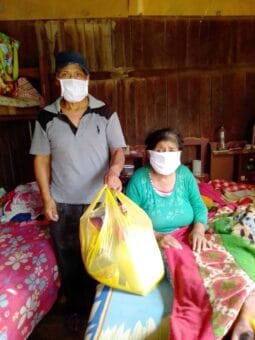
Jul 3, 2020 | Non categorizzato
A first hand account from Ofelia, who herself emigrated from Venezuela to Peru with her family and now works with the Focolare community to help her fellow-Venezuelians who are suffering even more since the pandemic. As members of the Focolare Movement, we have been running a solidarity program supporting Venezuelans in Peru for some time. The pandemic has forced us to seek new strategies to reach them where they are staying. 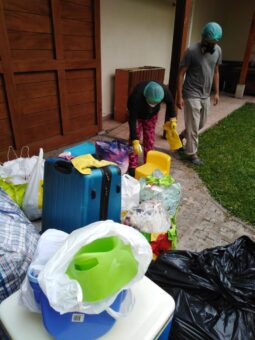 What we discover is that more than anything else, they need someone to listen to them. It’s not always easy because we’re not talking about one or two families, but many and the number is increasing every day. The monthly Word of Life always helps me because it encourages me to go out to my neighbours and recognize that I’m meeting Jesus in each one of them. One morning a Venezuelan mother called me in tears about her daughter who was due to give birth in the next few days but was being threatened with eviction. I listened to her for at least an hour until she began to calm down. Whenever I felt like saying something, I reflected, “The only thing I need to do here is to love her, and she needs to talk this through”. Eventually she said to me, “Good, I’ve really unburdened myself”. That was the point at which I could tell her where to find the help she needed. Initially, I thought that during quarantine, our work with the migrant community would slow down. But in fact it’s been exactly the opposite! For example, the work we carry ahead with CIREMI (The Inter-Religious Commission for Migrants and Refugees) keeps us very busy and has been a way to get to know each other better. The Commission members include some Scalabrini fathers, Christians from various Churches, the Jewish community, some Muslims, a Catholic reverend sister and a group from the Focolare Movement.
What we discover is that more than anything else, they need someone to listen to them. It’s not always easy because we’re not talking about one or two families, but many and the number is increasing every day. The monthly Word of Life always helps me because it encourages me to go out to my neighbours and recognize that I’m meeting Jesus in each one of them. One morning a Venezuelan mother called me in tears about her daughter who was due to give birth in the next few days but was being threatened with eviction. I listened to her for at least an hour until she began to calm down. Whenever I felt like saying something, I reflected, “The only thing I need to do here is to love her, and she needs to talk this through”. Eventually she said to me, “Good, I’ve really unburdened myself”. That was the point at which I could tell her where to find the help she needed. Initially, I thought that during quarantine, our work with the migrant community would slow down. But in fact it’s been exactly the opposite! For example, the work we carry ahead with CIREMI (The Inter-Religious Commission for Migrants and Refugees) keeps us very busy and has been a way to get to know each other better. The Commission members include some Scalabrini fathers, Christians from various Churches, the Jewish community, some Muslims, a Catholic reverend sister and a group from the Focolare Movement.  As we were considering how best to reach the most vulnerable, we began to receive requests for clothing and blankets. Because of lockdown restrictions, we arranged for a taxi to transport the clothes we had collected from the local Focolare community to a place in Lima city where they could be collected. And some baby clothes arrived just in time for two families with new-born babies. We regularly work in collaboration with the United Nations Agency for Refugees and they provided us with a supply of blankets which meant we could meet the needs of even more people. It’s amazing to see how often we receive just what our people in need are asking us for. God doesn’t miss a thing! One day I received a phone call from Carolina, a Jewish Community leader. She told me some of their families were transferring to Israel, and so had clothes and other items they’d be leaving behind. She was so happy when she heard we were collecting such things to benefit the Venezuelan community that she herself paid the taxi expenses to transport them over to us. During this telephone conversation, we also asked about each other’s families, and it called to mind a phrase from the Word of Life: “It’s friendship – which can become a network of positive relationships and helps to bring the commandment of mutual love to life – that builds true fraternity”. The exchange with this my Jewish sister showed me the truth of this. It’s wonderful to see how contagious fraternity is. The people who received clothes and blankets from us, in turn sent us photos and one of them wrote, “My next door neighbour was in need of clothing, so I shared what you sent with her”. A chain of remembering the needs of others has been forged. In this way fraternity finds a way of growing – even during quarantine!
As we were considering how best to reach the most vulnerable, we began to receive requests for clothing and blankets. Because of lockdown restrictions, we arranged for a taxi to transport the clothes we had collected from the local Focolare community to a place in Lima city where they could be collected. And some baby clothes arrived just in time for two families with new-born babies. We regularly work in collaboration with the United Nations Agency for Refugees and they provided us with a supply of blankets which meant we could meet the needs of even more people. It’s amazing to see how often we receive just what our people in need are asking us for. God doesn’t miss a thing! One day I received a phone call from Carolina, a Jewish Community leader. She told me some of their families were transferring to Israel, and so had clothes and other items they’d be leaving behind. She was so happy when she heard we were collecting such things to benefit the Venezuelan community that she herself paid the taxi expenses to transport them over to us. During this telephone conversation, we also asked about each other’s families, and it called to mind a phrase from the Word of Life: “It’s friendship – which can become a network of positive relationships and helps to bring the commandment of mutual love to life – that builds true fraternity”. The exchange with this my Jewish sister showed me the truth of this. It’s wonderful to see how contagious fraternity is. The people who received clothes and blankets from us, in turn sent us photos and one of them wrote, “My next door neighbour was in need of clothing, so I shared what you sent with her”. A chain of remembering the needs of others has been forged. In this way fraternity finds a way of growing – even during quarantine!
by Ofelia M. as told to Gustavo Clariá

 Here we discuss it with Luca Fiorani, professor at the universities of Lumsa, Marconi and Sophia; ENEA researcher; and head of EcoOne, the Focolare Movement’s ecological network. In these times of pandemic, what lessons can come from Laudato Si’ and its paradigm of integral ecology? I am thinking of how “everything is connected”. The pope, before the pandemic, made us savour its positive side, the wonderful relationship that exists between elements of nature, including people. The pandemic, on the other hand, has brought out the dark side of “everything is connected”, because human activity, which led to the destruction of natural habitats, and the virus’s leap of species from animal to man are linked. What is the evangelical foundation of being committed to care for creation? It is “Love thy neighbour as thyself.” One of the key concepts of Laudate is, “Listen to both the cry of the earth and the cry of the poor”. It is true that for the Gospel, nature has value in itself, but it is also true that caring for nature means ensuring a healthy planet for the most disadvantaged and for our children. It means reminding us of the “lower billion” – those billion people who are victims of a “chronic pandemic” due to 17 neglected tropical diseases. Can the concept of integral ecology guide the future? This is the fundamental concept of all Pope Francis’ teaching, which invites us to overcome the current socioeconomic system. Today we still live with the paradigm of the industrial revolution, which considers natural resources unlimited. Yet resources are indeed limited, and therefore we need to find a different model of development that also takes into account the needs of peoples forgotten by so-called “evolved” societies. Laudate calls for a change of attitude. What does it mean to live the principles of integral ecology? Integral ecology concerns not only the environment but all aspects of human life: society, economy and politics. Therefore each of us must try to change our lives, starting, for example, with consumer choices. Then we can choose leaders who are sensitive to caring for nature and campaign to apply pressure to disinvest from fossil fuels in favour of renewable energy. In this special year of Laudato Si’ celebrations, how will the Focolare Movement participate? The movement participates in initiatives of the Catholic Church and in events promoted by the Global Catholic Climate Movement, to which it adheres. In addition, it is organising a “New ways towards integral ecology” conference, to be held at Castel Gandolfo (RM) from 23–25 October, details of which are available at ecoone.org. Your latest book is entitled Francesco’s crazy dream: a small (scientific) manual of integral ecology. Why do you speak of a crazy dream? Because it truly seems impossible to change the course of this planet towards a world where we all feel like brothers and sisters, and build more bridges than walls. But as Focolare’s founder Chiara Lubich said, “Only those who have great ideals make history!”
Here we discuss it with Luca Fiorani, professor at the universities of Lumsa, Marconi and Sophia; ENEA researcher; and head of EcoOne, the Focolare Movement’s ecological network. In these times of pandemic, what lessons can come from Laudato Si’ and its paradigm of integral ecology? I am thinking of how “everything is connected”. The pope, before the pandemic, made us savour its positive side, the wonderful relationship that exists between elements of nature, including people. The pandemic, on the other hand, has brought out the dark side of “everything is connected”, because human activity, which led to the destruction of natural habitats, and the virus’s leap of species from animal to man are linked. What is the evangelical foundation of being committed to care for creation? It is “Love thy neighbour as thyself.” One of the key concepts of Laudate is, “Listen to both the cry of the earth and the cry of the poor”. It is true that for the Gospel, nature has value in itself, but it is also true that caring for nature means ensuring a healthy planet for the most disadvantaged and for our children. It means reminding us of the “lower billion” – those billion people who are victims of a “chronic pandemic” due to 17 neglected tropical diseases. Can the concept of integral ecology guide the future? This is the fundamental concept of all Pope Francis’ teaching, which invites us to overcome the current socioeconomic system. Today we still live with the paradigm of the industrial revolution, which considers natural resources unlimited. Yet resources are indeed limited, and therefore we need to find a different model of development that also takes into account the needs of peoples forgotten by so-called “evolved” societies. Laudate calls for a change of attitude. What does it mean to live the principles of integral ecology? Integral ecology concerns not only the environment but all aspects of human life: society, economy and politics. Therefore each of us must try to change our lives, starting, for example, with consumer choices. Then we can choose leaders who are sensitive to caring for nature and campaign to apply pressure to disinvest from fossil fuels in favour of renewable energy. In this special year of Laudato Si’ celebrations, how will the Focolare Movement participate? The movement participates in initiatives of the Catholic Church and in events promoted by the Global Catholic Climate Movement, to which it adheres. In addition, it is organising a “New ways towards integral ecology” conference, to be held at Castel Gandolfo (RM) from 23–25 October, details of which are available at ecoone.org. Your latest book is entitled Francesco’s crazy dream: a small (scientific) manual of integral ecology. Why do you speak of a crazy dream? Because it truly seems impossible to change the course of this planet towards a world where we all feel like brothers and sisters, and build more bridges than walls. But as Focolare’s founder Chiara Lubich said, “Only those who have great ideals make history!” 








 “This lockdown has given each of us the chance to go even deeper into those messages that we have been singing for more than 50 years,” says production manager Massimiliano Zanoni. “We’re used to traveling the world, meeting people and bringing music to stages on five continents, but we found ourselves locked inside the four walls of our house. Instead of cities, seas and mountains, we now had a computer and few windows to look out of. And instead of the thousands of people we met on each tour, we now had three, four people living with us. All 25 of us could not work, create and play together as we had done for 53 years. And so, after a first series of live streams called “Gen Rosso a casa tua,” in which they joined people virtually in their home, they thought they would get back to their roots with some historical live shows. The “Discovering Gen Rosso” project started to bring people back into the band’s home.
“This lockdown has given each of us the chance to go even deeper into those messages that we have been singing for more than 50 years,” says production manager Massimiliano Zanoni. “We’re used to traveling the world, meeting people and bringing music to stages on five continents, but we found ourselves locked inside the four walls of our house. Instead of cities, seas and mountains, we now had a computer and few windows to look out of. And instead of the thousands of people we met on each tour, we now had three, four people living with us. All 25 of us could not work, create and play together as we had done for 53 years. And so, after a first series of live streams called “Gen Rosso a casa tua,” in which they joined people virtually in their home, they thought they would get back to their roots with some historical live shows. The “Discovering Gen Rosso” project started to bring people back into the band’s home. 
 What we discover is that more than anything else, they need someone to listen to them. It’s not always easy because we’re not talking about one or two families, but many and the number is increasing every day. The monthly Word of Life always helps me because it encourages me to go out to my neighbours and recognize that I’m meeting Jesus in each one of them. One morning a Venezuelan mother called me in tears about her daughter who was due to give birth in the next few days but was being threatened with eviction. I listened to her for at least an hour until she began to calm down. Whenever I felt like saying something, I reflected, “The only thing I need to do here is to love her, and she needs to talk this through”. Eventually she said to me, “Good, I’ve really unburdened myself”. That was the point at which I could tell her where to find the help she needed. Initially, I thought that during quarantine, our work with the migrant community would slow down. But in fact it’s been exactly the opposite! For example, the work we carry ahead with CIREMI (The Inter-Religious Commission for Migrants and Refugees) keeps us very busy and has been a way to get to know each other better. The Commission members include some Scalabrini fathers, Christians from various Churches, the Jewish community, some Muslims, a Catholic reverend sister and a group from the Focolare Movement.
What we discover is that more than anything else, they need someone to listen to them. It’s not always easy because we’re not talking about one or two families, but many and the number is increasing every day. The monthly Word of Life always helps me because it encourages me to go out to my neighbours and recognize that I’m meeting Jesus in each one of them. One morning a Venezuelan mother called me in tears about her daughter who was due to give birth in the next few days but was being threatened with eviction. I listened to her for at least an hour until she began to calm down. Whenever I felt like saying something, I reflected, “The only thing I need to do here is to love her, and she needs to talk this through”. Eventually she said to me, “Good, I’ve really unburdened myself”. That was the point at which I could tell her where to find the help she needed. Initially, I thought that during quarantine, our work with the migrant community would slow down. But in fact it’s been exactly the opposite! For example, the work we carry ahead with CIREMI (The Inter-Religious Commission for Migrants and Refugees) keeps us very busy and has been a way to get to know each other better. The Commission members include some Scalabrini fathers, Christians from various Churches, the Jewish community, some Muslims, a Catholic reverend sister and a group from the Focolare Movement.